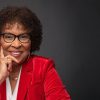BY MERIS STANSBURY
School and district leaders should consider a Future Ready Librarian framework to better enable innovative strategies and practices.
According to the U.S. Department of Education’s Office of Education Technology, librarians are at the forefront of helping schools become future ready. However, too often librarians are left out of the planning process for infrastructure and devices, professional learning for teachers, and digital content strategies—areas where they often have expertise.
The Alliance for Excellent Education (the Alliance) launched its Future Ready Schools (FRS) initiative in October 2014 with the aim of leveraging technology and connectivity to personalize and transform learning. In June 2016, the Alliance, in partnership with the U.S. Department of Education’s Office of Educational Technology, expanded FRS to position school librarians as leaders in this effort.
Michelle Luhtala, department chair of the New Canaan, CT, High School Library and a 2015 Library Journal Mover & Shaker, is a leader in helping teacher-librarians all around the country to become Future Ready. She kicked off Season 6 of the Emerging Tech series of webinars on edWeb.net October 19th with a live broadcast from New Canaan High School on the topic of “Future Ready Librarians.” Her guests for this online discussion were Mark Ray, Chief Digital Officer for Vancouver Public Schools and Sara Trettin, Open Education and Digital Engagement Lead, Office of Educational Technology, U.S. Department of Education. The broadcast was attended by 450 librarians and educators for an informative and engaging discussion with the whole audience.
Watch: Changing the conversation about librarians
Future Ready Goals=Librarian Goals
The Future Ready movement grew out of the Connect Ed initiative launched by President Obama in 2013 with several goals: to connect 99 percent of students in schools to broadband and to address the need for more professional learning and leadership to ensure the effective use of technology. In 2014 a Future Ready Pledge was launched as a commitment on the part of superintendents to provide the necessary infrastructure and devices, to support professional learning for teachers, and to provide high-quality digital content.
However, Future Ready is focused on collaborative leadership, not just the superintendent. The Future Ready Framework published on the website futureready.org is designed to help many people who are looking to make change concurrently. Future Ready has developed a common set of information, tools, and assessment, that are all available for free.
Luhtala commented that New Canaan High School went BYOD just this year as part of their personalized learning initiative, and it’s helping teachers empower their students to develop their own interests and learning plans with more flexible learning environments, extending learning outside the classroom, and collecting data to inform instruction so that it is truly reflective of each learner’s ability.
Trettin mentioned the 2016 National Education Technology Plan that is updated every five years and relates very closely to these initiatives. She said that some schools are reading the Plan as a kind of book club for their professional learning communities, reading one chapter at a time.
Why Librarians Can Help
Ray added that Vancouver is four years into their 1:1 implementation, and though they have a mature implementation, they are still working on personalization. They have created the enabling conditions but, “you can’t take a pill and become future ready.” He explained that districts realize the devices alone don’t personalize learning, and digital content and open education resources still require mediation and planning.
The challenge is to figure out how to leverage technology to really get individualized learning outcomes, and no one has figured that out yet, he emphasized.
“Your schools need a good tech department and overall financial support to make sure these devices will work. Without the baseline infrastructure from the bottom up, devices don’t mean much,” said one broadcast participant.
As a school librarian, Luhtala commented that her concern was that there was a big giant plan that looked great, but didn’t really address the role of the librarian—a position that is best poised to facilitate this movement.
“Although we have a library services department, we receive very little support from them in making libraries real libraries,” noted one broadcast participant.
The Future Ready Librarians Framework
Ray and Trettin discussed how conversations evolved about how to connect librarians to Future Ready work and a growing recognition that librarians are essential to the process, especially when they are trained and provided with devices before the teachers, and are engaged in conversations about digital citizenship. The Future Ready Librarians Framework acknowledges that librarians play a powerful role in:
- Curating digital resources and tools
- Empowering students as creators
- Building instruction partnerships
- Designing collaborative spaces
“We are getting ready to set up 2-3 new library spaces and would love to know what resources are out there to share as a reference for the principals as we start to plan,” said one participant.
Anyone can view the recording of the broadcast at http://home.edweb.net/webinar/future-ready-librarians/
The broadcast was hosted by edWeb.net and sponsored by Mackin.






